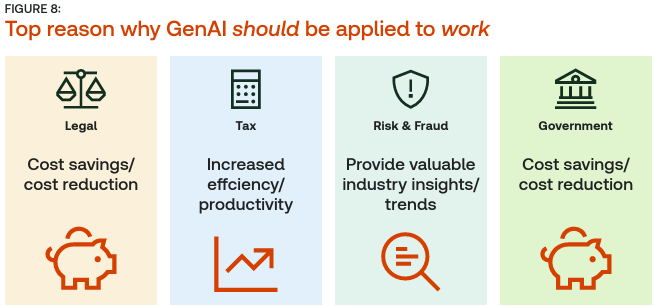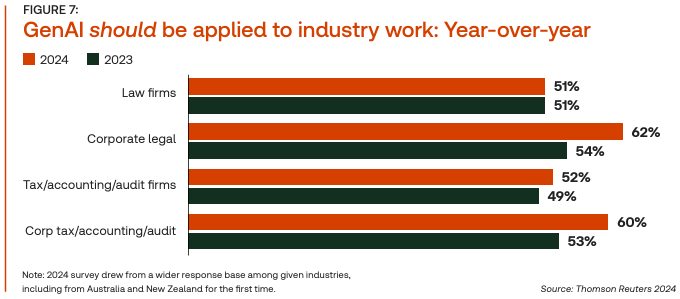Legal professionals, whether they work for law firms, corporate legal departments, government, or in risk and fraud, have generally positive perceptions of generative AI (GenAI). According to the professionals surveyed in the Thomson Reuters Institute’s 2024 GenAI in Professional Services report, 85% of law firm and corporate attorneys, 77% of government legal practitioners, and 82% of corporate risk professionals believe that GenAI can be applied to industry work.
But should it be applied? There, those positive perceptions softened a bit, with 51% of law firm respondents, 60% of corporate legal practitioners, 62% of corporate risk professionals, and 40% of government legal respondents saying yes.
In short, professionals’ perceptions of AI include concerns and interest in its capabilities. Those concerns include the ethics of AI usage and mitigating related risks. These are important considerations. But they don’t need to keep professionals from benefiting from all that GenAI can do. Professionals can minimize many of the potential risks by becoming familiar with responsible AI practices.
 |
Jump to ↓
Why professionals should use GenAI
Using GenAI responsibly and ethically
AI resources for professionals
Trending perceptions
When the Thomson Reuters Institute surveyed legal and tax professionals in the spring of 2023, 78% of respondents said that GenAI can be applied to their work. Compared side by side with the 2024 survey results, this suggests that professionals’ perceptions of GenAI have become somewhat more positive in the past year.
But again, general perceptions of AI among professionals also include a great deal of skepticism. Asked about their top concerns about GenAI, the professionals surveyed in the GenAI Report cited the technology’s potential for inaccurate responses (70%), the challenges of complying with relevant laws and regulations (60%), and ensuring that GenAI tools are used ethically and responsibly (57%).
With the use and understanding of AI steadily growing, it’s becoming clear that it won’t supplant professional expertise. This means that GenAI needs to be used specifically for the work it does best. It also means that it should be used carefully and thoughtfully. Professionals will need to oversee GenAI’s results to ensure its usefulness and reliability.
Why professionals should use GenAI
Trends or perceptions shouldn’t keep professionals from considering how AI can be used in their work. True, it can’t replace professional knowledge, experience, and discernment. Nor should it. However, it can augment work to allow professionals to focus on what they do best.
Respondents in the report who believe GenAI should be applied to their work offered several different reasons why, but many focused particularly on the technology’s business impact. Legal industry respondents pointed to GenAI’s potential for cost savings and increased productivity, its ability to allow them to spend more time on high-value tasks, and its potential to aid in quality control checks. Corporate risk and fraud professionals cited GenAI’s ability to provide industry insights and boost decision-making.

A well-crafted AI tool can take on necessary but time-consuming tasks such as research and document review. This allows professionals to focus on more compelling and profitable uses of their time, focusing their expertise on adding value for clients, companies, and government agencies.
Using GenAI responsibly and ethically
Yes, there are risks and challenges involved with GenAI. But that doesn’t mean that professionals should simply avoid it based on perceptions. It’s not going to go away. Given all the ways that GenAI can help make work more productive and profitable, a more useful approach is to become familiar with the ethical considerations and challenges of GenAI in order to mitigate its risks and reap its benefits.
How can professionals minimize the risks? One way is by choosing GenAI tools developed specifically for their profession. One major risk is the data sources that a GenAI tool uses for “training” itself to provide usable data and research. Unfortunately, in many cases, the data it uses may be inaccurate.
As professionals conduct due diligence on potential AI tools, they should include in their considerations the distinction between public AI and private AI. Simply stated, public AI accesses the entire internet for research and data. As a result, it may access and use false information or private data, which means that the results the tool provides could place users at risk of violating professional ethics. Private AI, by contrast, uses databases that have been developed to access trusted sources of data and research. By adopting an AI platform rooted in data from reliable sources, professionals can be more confident about its precision and accuracy—indispensable attributes for ethical practitioners.
|
– 2024 Generative AI in Professional Services report
As professionals become more familiar with and more open to using GenAI tools, it’s essential that they understand trends and key updates related to AI. By staying informed about AI developments, professionals can anticipate changes in the industry, adapt their skills accordingly, and maintain a competitive edge. Ultimately, this knowledge ensures that professionals are not only participants but also innovators in the AI-driven landscape of the future.
Check out our artificial intelligence blog series to learn how AI help you move faster, see further, and accomplish more.
 |











